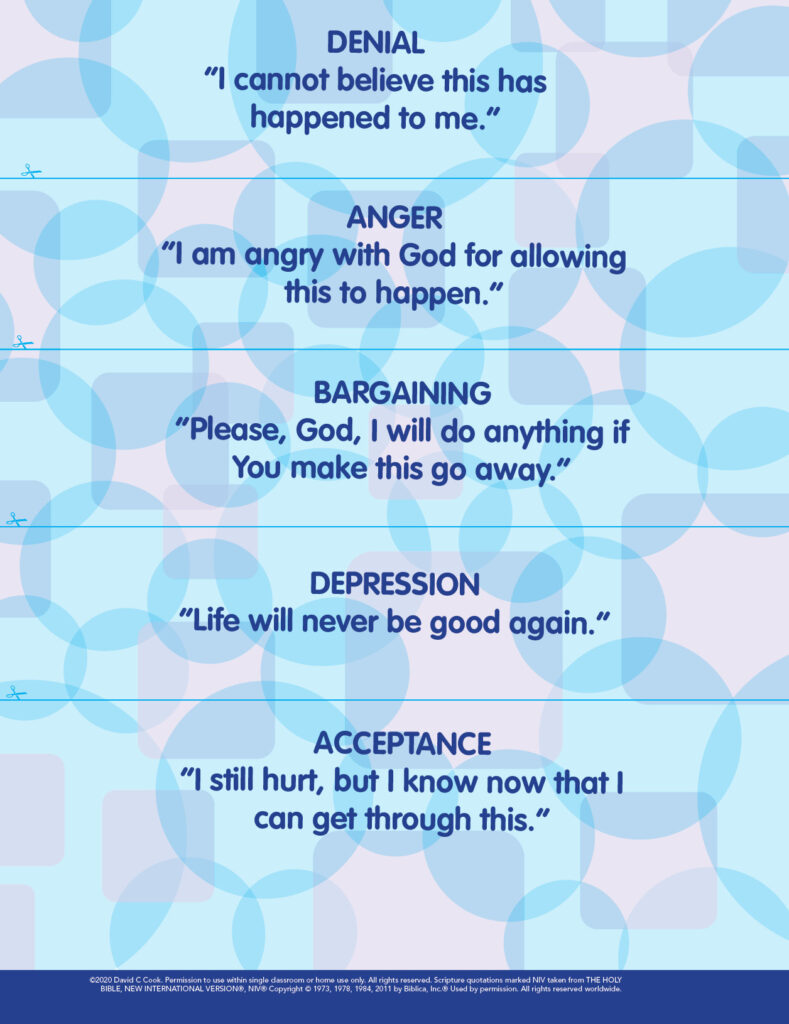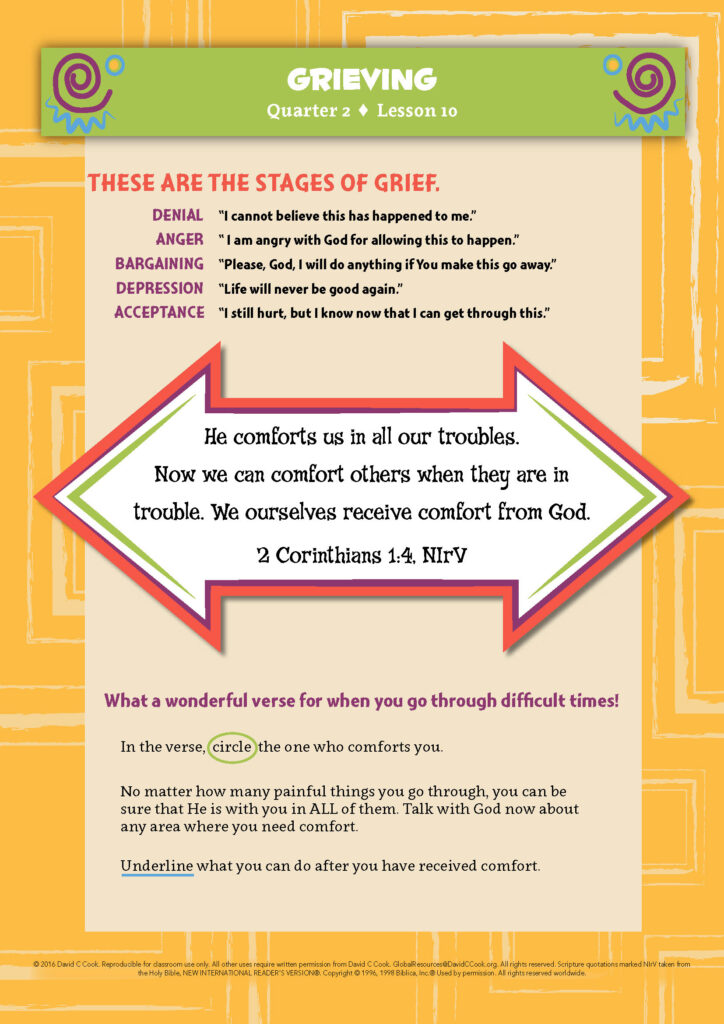During the lesson, the information for you to know is written in regular type, and what we suggest speaking or reading aloud to children is in bold. All resources for this lesson, including the Teacher Guide, Student Page, Family Connection Card, and other resources can be downloaded in a ZIP file by clicking on the following link:
In some lessons you will find "resource articles." These are articles written by experts from around the world to help equip you for your work with children and adolescents. Share them with parents or guardians if you consider it appropriate.
Blessed are those who mourn, for they will be comforted.
Matthew 5:4
Painful things happen to all of us in this life. As Christians we may feel that we have to hide our grief from other people. Yet having the joy of the Lord does not mean we must deny our pain and grief.
In this lesson you will introduce children to 5 stages of the grieving process: denial, anger, bargaining, depression, and acceptance. The stages leading up to acceptance bring intense, uncomfortable emotions. As a committed Christian, we may think these stages are extreme or unnecessary. This is not the case. Each stage is a natural, even healthy, step in grieving and healing.
Think back on big losses you have experienced. Did you have the space and time to process your grief, or did you feel you had to hide your pain? Spend time now allowing God to comfort you. He knows what you need. He knows your thoughts and emotions, even the ones buried under the surface.
Let families know that you will be teaching children about the grieving process. Inform them that doctors and counsellors have labelled 5 steps to this process: denial, anger, bargaining, depression, and acceptance. Share the information in the Resource Article in front of this lesson with the families.
Teacher Tip: If possible, email or text the Family Connection Card to the families of your students.
Greet each child by name as she arrives. This lesson addresses a very serious topic: the grieving process. So use this arrival time to show children you care in a more upbeat way. Ask each child what the “high five” (or best) moment of his week was. Then give each child a high five!
Have the children sit in a circle. Ask for volunteers, one at a time. Whisper an emotion in the ear of the volunteer and ask her to act out that emotion with her body and facial expressions. The others should try to guess what emotion she is acting. Repeat this process several more times with other volunteers.
Here are some of the emotions you might use:
It is not always easy to guess emotions. People express them in different ways. Yes, our faces and body language tell a lot about what we are feeling, but they do not tell everything.
Because people show their emotions in different ways, it is sometimes hard to understand what they are really feeling. Think about anger. People may show that they are angry by changes in facial color, clenching fists, shouting, or getting excited. However, some people show anger by being silent or not eating. Sometimes we do not even understand our emotions ourselves.
Emotions that show grief and loss are often among the most difficult to identify immediately. When you lose someone or something important to you, it is natural to grieve. Most of us cry at first, but as time goes on, we sometimes hide our emotions. They do not go away. They just go below the surface.
This is bad for us. Others think we are fine, so they do not try to help us. In reality, we are hiding our grief and often hurting ourselves in the process. Why? Because we are not healing the way we need to heal in order to be healthy today and in the future.
Explain that for many years, people have studied the subject of grief. They have discovered that people go through stages of grief. Share the following information:
Now we are going to talk about the stages of grief. People do not all go through the stages of grief in the same amount of time. Some people take weeks, others take months, and sometimes people take years.
Not everyone goes through all of the stages. Also, people do not always go through the stages in the same order. People may go through a stage more than once. However, God is with us in every stage, walking with us and comforting us. Let’s learn about each of the stages.
Get out your papers with the five stages of grief on them: Denial, Anger, Bargaining, Depression, and Acceptance. Hold up each sheet as you talk about that stage.

DENIAL: Denial happens when a person is shocked by the loss and cannot believe it is true. The person thinks, “It happens to other people—not to me!”
Tell the children they have 15 seconds to create quick “frozen pictures” that show the denial stage of grieving. They can stand and use facial expressions and their bodies to express denial. Encourage them to hold their frozen pictures still for 10–20 seconds while you look at each one.
ANGER OR RESENTMENT: Anger or resentment is usually the second stage of grieving. Grieving people get angry with anyone they think is responsible for making the loss happen. They are feeling such pain that sometimes they get angry with doctors, or God, or even the person who died. This is a normal stage of grief. When people are in this stage it is easy to think they have lost their faith in God. This is not true. They need to express their frustration and work through this part of the grieving process.
Have children turn to their neighbors. Encourage them to demonstrate the emotions they may experience during the anger/resentment stage using only their facial expressions.
BARGAINING: Bargaining is often the next part of the grief process. The person tries to talk God into changing the loss by promising to do something for Him. The person who says, “If you bring my mother back, I will become a Christian” is an example of someone bargaining.
DEPRESSION: Another stage of grieving is depression. This is a hopeless feeling that makes us feel as if there is no purpose to anything. Depression is a paralyzing feeling because it prevents us from doing things we want or need to do. Almost everyone who has experienced loss experiences depression. People who move through this stage of grief go on to the last stage, acceptance.
Have children close their eyes. With their eyes closed, have them raise their hands if they have ever felt depressed after experiencing a great loss or sadness. Maybe they felt hopeless. Maybe they are even feeling that way now. After several seconds, have children put their hands down and then open their eyes.
ACCEPTANCE: A child in the acceptance stage may think something like, “I miss my brother, but I know he loved Jesus and is happy in heaven. Still, I will always miss him.” She has accepted the truth that her brother is dead and that she cannot change the loss. She is thankful for having had her brother, and now she is ready to go on with her life. This does not mean she forgets her brother or does not miss him anymore. This is a healthy place to be.
When we understand the grieving process, we do not need to worry that a person who is grieving has stopped trusting in God. We will realize that he is normal and is just working through his sorrow.
There are also two other steps that many children experience in their grief—guilt and fear. Children often feel guilty about somehow causing the loss. Because they do not understand the causes behind losses, they feel responsible for them. Abandonment is one example. “Mother would not have left me if I had been a better person.” Obviously, the child’s reasoning is not correct.
Children are often afraid that what happened to someone close to them will also happen to them. What they do not understand, they fear. For example, a child might think: “His mother has AIDS and is dying. I am afraid my mother will get AIDS and die too.”
I will now read statements a friend who is grieving might say. After each statement, I will ask you some questions. Then I will share what the Bible might say to that person.
Read each of the Bible verses below directly from your Bible.
Optional Supplies: Set the five sheets with the stages of grief at the front of your teaching area so children can refer to them during this activity.
1. My brother has cancer and is dying. If I am good and never disobey my mother, I know that God will heal my brother and he will not die.
This person is in the bargaining stage.
Hear my cry, O God; listen to my prayer. From the ends of the earth I call to you, I call as my heart grows faint; lead me to the rock that is higher than I. For you have been my refuge, a strong tower against the foe. I long to dwell in your tent forever and take refuge in the shelter of your wings.
Psalm 61:1–4
God loves us. God alone determines the number of our days. We cannot bargain with God, but we can always come to Him and take refuge in Him.
2. My little sister cannot be dead. Children do not die.
This person is in the denial stage.
Everyone will die someday.
Ecclesiastes 7:2, NIrV
It is very sad when children die. Every person will die someday, but God cares about every person’s grief and wants to comfort her.
3. I am afraid I will get sick and die like my brother did.
This person is likely feeling fearful. He is scared that he will get sick and die like his brother.
So do not fear, for I am with you; do not be dismayed, for I am your God. I will strengthen you and help you; I will uphold you with my righteous right hand.
Isaiah 41:10
Whatever you face in life, God is there to help you!
4. God, I hate You because You let my father die.
This person is in the anger or resentment stage.
Therefore, just as sin entered the world through one man, and death through sin, and in this way death came to all people, because all sinned.
Romans 5:12
The Bible tells us that death came into the world at the beginning when Adam and Eve sinned. God does not mind if you tell Him how you really feel. After you do, be quiet and listen to what He might bring to your mind from His Word. God made a way for people who believe in Jesus to live forever with Him.
Jesus said to [Martha], “I am the resurrection and the life. The one who believes in me will live, even though they die.”
John 11:25
5. I will never get over losing my arm in the accident. Now I am worthless.
This person is in the depression stage.
Who shall separate us from the love of Christ? Shall trouble or hardship or persecution or famine or nakedness or danger or sword? …
For I am convinced that neither death nor life, neither angels nor demons, neither the present nor the future, nor any powers, neither height nor depth, nor anything else in all creation, will be able to separate us from the love of God that is in Christ Jesus our Lord.
Romans 8:35, 38–39
Very difficult and painful things may happen to us that make us question our value. Even if it is hard to understand, we can learn that the love God has for us is greater than our circumstances. We can also learn that our value is found in God, not our circumstances.
6. I miss my mother, but I know she loved Jesus. She is happy in heaven, but I will always miss her.
This person is in the acceptance stage.
The God of all comfort] comforts us in all our troubles, so that we can comfort those in any trouble with the comfort we ourselves have received from God.
2 Corinthians 1:3–4
God comforts us when we are grieving. We can help comfort others when they experience grief because of the comfort we have received.
Optional Supplies: If you are using the Student Pages, allow the children to complete the activity on the page.

If you are using The Action Bible, ask the children to read the story on pages 406–409. Before they start, tell them to pay special attention to the girl in the pink dress. She was a slave. She was taken from her homeland and away from her parents. The Bible does not tell us much about her, not even if her parents were alive or dead. It was very possible that they were killed she was taken captive. She served a man and woman who were nice to her. But she knew she would probably never go home again.
After the story, divide the children into small groups and ask them to discuss the following questions.
Have children spread out , but they should still be able to see and hear you clearly.
We will take a few minutes to pray for people we know who are grieving. Close your eyes. In your mind, picture a child you know who is grieving. Set one hand in your lap and hold up 1 finger on that hand. That finger represents the child you are praying for. Pray quietly that God will help her go through the grieving process in a healthy way. Use the child’s name when you talk to God.
Continue to pray for other children you know who are grieving. Hold up a finger for each child. If you are grieving a loss in your life, you can pray for yourself as well. Do not forget to hold up a finger if you pray for yourself. Continue until you have prayed for all the children you know who are grieving.
The Lord is close to the brokenhearted and saves those who are crushed in spirit.
Psalm 34:18

When you are sad, God is sad with you. He promises to stay near to those who are grieving and who feel like their hearts are breaking.
Have the children use their other hand to gently cover the fingers they are holding up.
Imagine that your other hand is God. I am going to say a prayer. As I do, picture God placing His arms gently around the children you for whom prayed.
Dear Jesus, comfort each child represented by our raised fingers. You know each of their names. You know why they are grieving and You promise to be near to them. Help them to know that You are with them. Amen.
Here are two things to remember: First, God may give you a chance to comfort the grieving friends you prayed for. If He does, you can share about the grieving process and pray together that God will help your friend to grieve well.
Second, you may be the one grieving. I am available to talk or pray with you if you want.
Have the students gather together and stand to receive this blessing:
Blessing: When you are sad and lonely and brokenhearted, may you know that the Lord is close to you. When it feels like no one notices your pain, God is with you. When you feel depressed and hopeless, God is with you. May you feel His arms around you, and may you share His comfort with others.
Lead the children in singing “Blessed Be Your Name” again. As the song says, even when we walk through difficult desert places, God is worthy of praise and He cares for us!
Life on Life ©2020 David C Cook. Reproducible for home or classroom use only. All other uses require written permission from David C Cook [email protected]. All rights reserved.